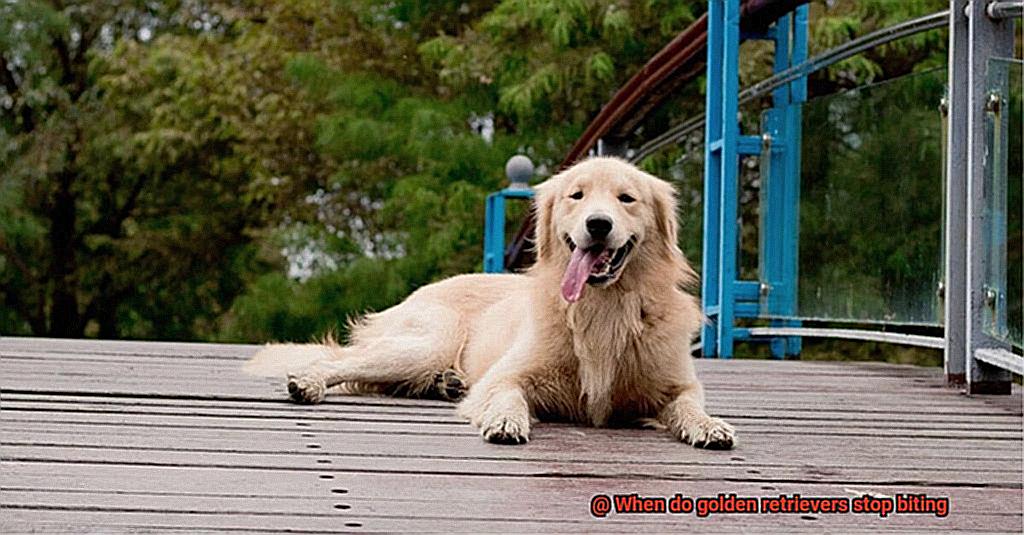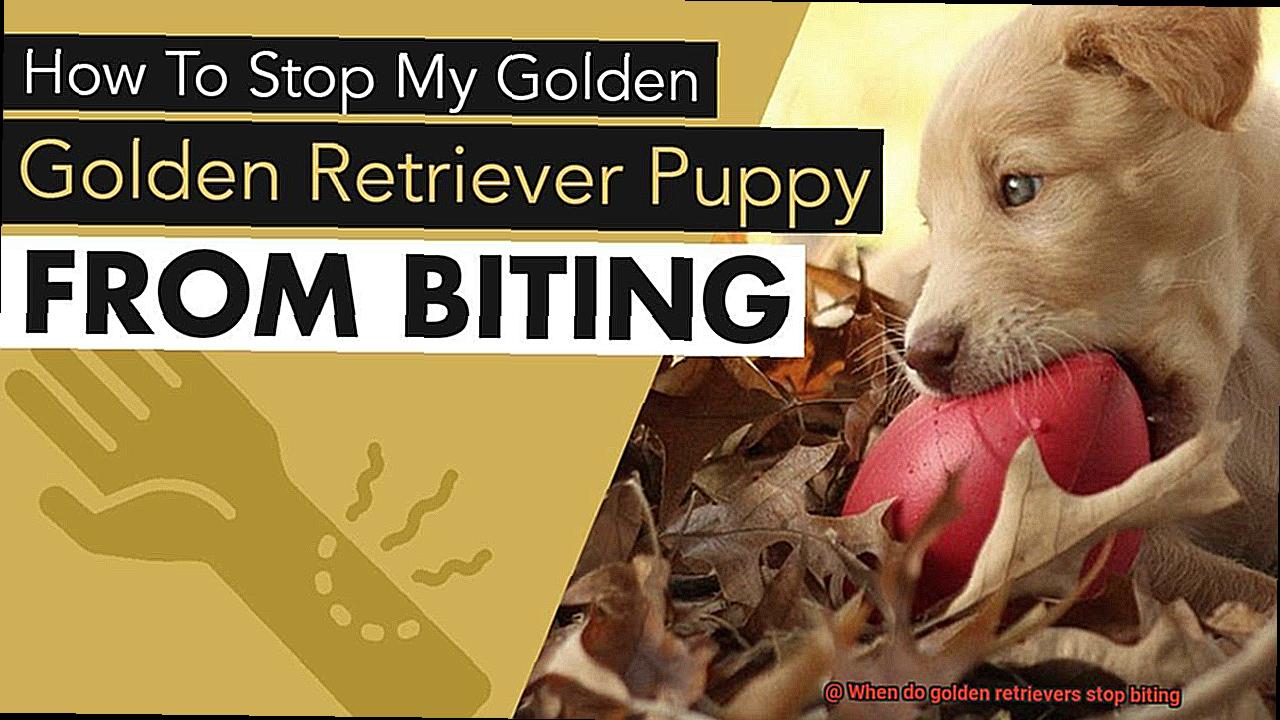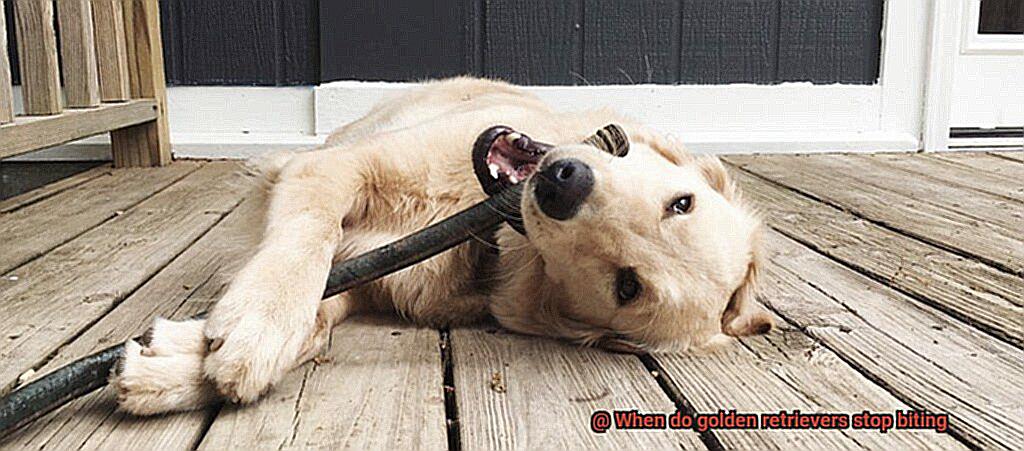Golden Retrievers are undoubtedly one of the most adorable dog breeds out there. Their soft fur, big brown eyes, and friendly demeanor make them irresistible to pet lovers. However, as cute as they may be, they can also be quite a handful when it comes to biting. As new furry friends, we all want to know and understand when do Golden Retrievers stop biting.
Puppy biting is a natural phase of a Golden Retriever’s development that can last up until they reach adulthood. While their nibbles might be cute at first, it’s essential to train them not to bite as they can grow up to be quite large and strong. So as an owner, you need to understand the right time to teach your dog not to bite.
In today’s blog post, we’ll explore when Golden Retrievers typically stop biting and what you can do to encourage them to stop. We’ll cover crucial topics like the teething process, controlling the biting, and bite inhibition essential in Golden Retriever training.

Are you tired of your furry friend nipping at your heels or playfully biting your hand? Don’t worry; we’ve got you covered. By the end of this post, you’ll have all the knowledge needed to help your furry friend become a well-trained, lovable addition to your family without any unwanted nibbling or gnawing. So let’s dive deeper into this topic and get started on training your Golden Retriever not to bite.
What is Biting?
Contents
Golden retrievers are known for their loving and affectionate nature, but like all puppies, they may resort to biting as a way of playing or seeking attention. While biting is a natural behavior in dogs, it is essential to manage this behavior to prevent it from becoming a persistent habit that could harm humans or other animals.
Biting behavior in golden retrievers can be classified into two types: aggressive and playful biting. Aggressive biting is a serious issue that requires immediate attention from a professional dog trainer or behaviorist. Playful biting, on the other hand, is a normal behavior that can be addressed with proper training and socialization.
It’s important to note that puppies tend to bite more frequently as they are teething and exploring their environment. However, as they mature, their biting behaviors should decrease as they learn proper ways to interact with humans and other dogs.
If you’re a golden retriever owner, it’s crucial to address any biting behavior early on to prevent it from becoming a problematic habit. Training and socialization are key components in managing biting behaviors in golden retrievers. Positive reinforcement techniques, such as rewarding good behavior, can help teach golden retrievers appropriate ways to interact with humans and other dogs.
Providing appropriate chew toys can also help ease the discomfort associated with teething and prevent destructive behaviors. It’s also essential to address any underlying causes of biting behavior, such as stress, anxiety, or lack of training.
Punishing your dog for biting is not an effective solution. Instead, use positive reinforcement techniques such as treats, praise, and playtime to encourage good behavior. Consistency in training and patience is key in helping golden retrievers stop biting.
When Do Golden Retrievers Stop Biting?
Golden retrievers are one of the most beloved dog breeds around the world, known for their friendly and gentle nature. However, like any other dog breed, golden retriever puppies may exhibit biting behavior during their early years. While it may seem adorable and playful initially, biting can develop into a serious issue if it persists into adulthood. So, when do golden retrievers stop biting?
Typically, golden retrievers stop biting between the ages of six to twelve months. During this period, it is crucial to train your furry friend to stop biting. One effective technique is redirecting their biting behavior to appropriate chew toys and bones, which helps teach them that biting on objects other than toys is not acceptable.
Consistent training and positive reinforcement are also essential in stopping biting behavior in golden retrievers. Rewarding good behavior with treats or praise can help reinforce positive habits and discourage negative ones. With proper training and socialization, any biting behavior can be managed and decreased as they mature.

However, if your golden retriever’s biting behavior persists even after the age of one year, it is recommended to seek professional help from a dog trainer or veterinarian. They can provide tailored advice based on your dog’s specific needs and help address the issue appropriately.
Reasons Why Golden Retrievers Bite
Golden Retrievers are known for their gentle and friendly nature, but like any other dog breed, they may exhibit biting behavior. Understanding the reasons why golden retrievers bite is essential to prevent and address this behavior. In this post, we will explore the five main reasons why Golden Retrievers bite.
Teething
Just like human babies, puppies go through a teething phase where their teeth are coming in and falling out. This can cause discomfort and pain, leading them to bite or chew on objects, including hands and feet. As a result, it’s important to provide your puppy with appropriate teething toys to redirect their biting behavior.
Fear or Anxiety
If a golden retriever feels threatened or anxious, they may lash out by biting. This can happen in situations such as meeting new people, encountering unfamiliar dogs or being in loud and crowded environments. It’s important to create a safe environment for your dog and to avoid situations that may trigger their fear or anxiety.
Lack of Socialization
Proper socialization is crucial for puppies to learn how to interact with humans and other dogs. If they are not properly socialized as puppies, they may not know how to interact with humans or other dogs, leading to fear or aggression which can manifest in biting. Socializing your puppy with other dogs and people at an early age can help prevent biting behavior.

Boredom or Lack of Exercise
Golden Retrievers are known for their high energy levels and need for physical activity. When they do not get enough exercise, they may become restless and agitated, leading them to take out their frustration through biting. Providing your dog with regular exercise and mentally stimulating activities can help prevent boredom and biting behavior.

Aggression or Dominance
Some golden retrievers may resort to biting as a form of aggression or dominance. This type of behavior is often seen in dogs that have not been properly socialized or trained. It’s important to seek professional help if your dog displays this type of behavior.
How to Teach Your Golden Retriever Not to Bite
Golden Retrievers are beloved for their friendly and affectionate nature, but they can also develop a biting habit that can be dangerous, especially when it comes to children or the elderly. As a responsible pet owner, it’s essential to teach your Golden Retriever not to bite. This important training should start as early as possible, ideally between 3-14 weeks old. Here are five effective tips on how to teach your Golden Retriever not to bite.
Socialization is Key
Socializing your Golden Retriever is critical for teaching them how to interact appropriately with others. It involves exposing your dog to different people, animals, and environments so they become comfortable and calm in new situations. You can take them for walks in busy areas, bring them to a dog park, or invite friends over to meet them. By doing this, you will help your pup learn how to interact safely with others.
Establish Boundaries and Rules
Establishing clear boundaries is essential to teaching your Golden Retriever not to bite. Your dog should understand what behaviors are acceptable and what are not. For example, if your dog nips or bites during playtime, stop the game immediately and firmly say “no.” Consistency in enforcing these boundaries is key.
Redirect their Biting Behavior
Puppies often use their mouths to explore the world around them, but this habit can become problematic if they start biting everything in sight. When you notice your puppy starting to bite or chew on something they shouldn’t, gently take it away and give them a chew toy instead. This will help them understand what is appropriate to chew on and what isn’t.
Positive Reinforcement
Positive reinforcement techniques can be very effective in teaching your Golden Retriever not to bite. Whenever your dog behaves appropriately and refrains from biting, reward them with praise and treats. This positive feedback will encourage your dog to repeat good behavior and discourage biting.
Patience and Consistency
Teaching your Golden Retriever not to bite takes time and patience. It’s important to remain consistent in reinforcing the rules and boundaries you’ve established. With consistent training and socialization, your dog will learn how to interact appropriately with others without resorting to biting.
Positive Reinforcement Techniques to Stop Biting

However, there are positive reinforcement techniques available to stop this behavior. Positive reinforcement is a training method that rewards good behavior rather than punishing the bad. This approach has been found to be more effective in changing behavior in dogs without causing fear and aggression.
One of the most effective techniques is clicker training. This involves using a clicker to make a sound when your dog exhibits the desired behavior, followed by a treat as a reward. The clicker sound soon becomes associated with the reward, and your dog will begin exhibiting the desired behavior more frequently. Clicker training is an excellent way to teach your golden retriever that biting is unacceptable.
Another technique to try is redirection. This involves redirecting your dog’s attention from biting to another activity, such as playing with a toy. When your dog starts to nip or bite, immediately offer them a toy or engage them in play instead of scolding or punishing them. This technique allows your dog to learn that biting is not acceptable while providing them with an alternative activity.
Consistency is key when using positive reinforcement techniques. You must be consistent in rewarding good behavior and redirecting negative behavior every time it occurs. It is also important to start training early and continue reinforcing positive behavior throughout your dog’s life.
What If My Golden Retriever Still Bites?
Biting behavior in golden retrievers is normal during their puppy stage as they explore the world with their mouths, but if it persists into adulthood, there may be underlying issues that need to be addressed.
Positive reinforcement training techniques are always a great starting point. Rewarding good behavior and redirecting biting onto appropriate toys can teach your golden retriever that biting humans is not acceptable. However, if this doesn’t work, seeking professional help from a dog trainer or behaviorist who can assess the situation and provide specific advice on how to address the behavior is crucial.
It’s also important to rule out any underlying medical issues that may be causing discomfort or pain, leading to aggressive behavior. Regular visits to the vet can ensure your furry friend is in good health and prevent any issues from developing.
Socialization plays a crucial role in preventing biting behavior in golden retrievers. Proper socialization with other dogs and people can help prevent fearful or aggressive behavior towards unfamiliar individuals. If your golden retriever has not been properly socialized, it’s never too late to start.
Conclusion
In conclusion, managing and decreasing biting behavior in Golden Retrievers is possible with proper training and socialization. Early intervention is key to preventing this natural behavior from becoming a problematic habit. Although Golden Retrievers typically stop biting between six to twelve months of age, consistent training and positive reinforcement are essential for stopping this behavior.
There are several reasons why Golden Retrievers bite, including teething, fear or anxiety, lack of socialization, boredom or lack of exercise, and aggression or dominance. Understanding these reasons can help prevent and address this behavior effectively.
Teaching your furry friend not to bite involves establishing clear boundaries and rules. Redirecting their biting behavior towards appropriate chew toys and providing positive reinforcement through treats and praise for good behavior can also be helpful. Socializing them with other dogs and people is another crucial aspect of preventing biting tendencies.
Patience and consistency are key when enforcing these rules. If your Golden Retriever’s biting persists even after one year of age or becomes aggressive, seeking professional help from a dog trainer or veterinarian is recommended. Positive reinforcement techniques such as clicker training and redirection can be effective in stopping biting behavior.
With proper training and socialization, your furry friend can become a well-trained addition to your family without any unwanted nibbling or gnawing.









